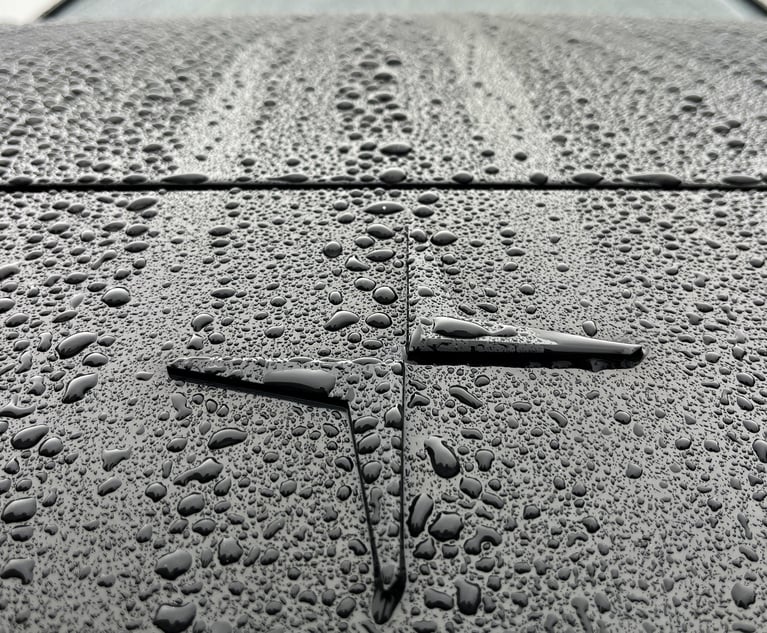Justices, Setting Video Playback Parameters, Reinstate $250,000 Award
"Because expert testimony was vital to the outcome of the trial, the trial court's refusal to allow plaintiff's counsel to replay a portion of [the] deposition was an error that resulted in a 'miscarriage of justice under the law',' warranting a new trial."
January 10, 2018 at 05:42 PM
4 minute read

The New Jersey Supreme Court on Wednesday reinstated a $250,000 jury verdict in an automobile accident case after a trial judge declined to allow play back of recorded expert testimony that apparently contained an error.
Justice Lee Solomon, writing for the unanimous court, called a denied motion to play back video of the deposition testimony a “miscarriage of justice,” and said generally: “counsel may refer to, read, or play portions of videotaped fact or expert testimony given at trial during closing, as long as (1) 'counsel's comments [are] confined to the facts shown or reasonably suggested by the evidence introduced during the course of the trial' … and (2) the concerns set forth in [Condella v. Cumberland Farms] are met.”
The decision overturns an Appellate Division holding that said the error, not detected or at least not pointed out at the time of the deposition, was no basis to order a new trial after an original no-cause verdict.
The issue arose in Hayes v. Delamotte when Dr. Arthur Vasen's prerecorded testimony, played in the courtroom, showed the doctor apparently comparing two identical MRIs rather than two taken a year apart, according to court documents.
The suit stemmed from a May 2008 single-vehicle crash and was lodged against the driver, Barbara Delamotte, by front-seat passenger Doreen Hayes, who had to be extricated from the vehicle and claimed she sustained disc herniations and underwent fusion surgery as a result. Her treating physician, Dr. Robert Sabo, contended that she sustained a permanent injury, while Vasen claimed the injury was a mere sprain, and the surgery was unnecessary.
The apparent error captured in video of Vasen's testimony might have been recognized at the time by Hayes' counsel but was not raised until the parties were preparing for summations.
At the conclusion of an April 2014 trial, Ocean County Superior Court Judge Mark Troncone denied a request to replay the video during summation but said Hayes “'would likely suffer an injustice if, as it appears, the defendant's medical expert likely misrepresented the MRI films to the jury.'” The jury returned a no-cause verdict.
But the judge did order a new trial on damages only, which in January 2015 ended with the $250,000 verdict.
Appellate Division Judges Carmen Alvarez, Mitchel Ostrer and Thomas Manahan ruling in May 2016 vacated the award and reinstated the original no-cause verdict because the judge, “presuming both the error of the testimony and the jury's reliance thereupon, assumed the role of the fact-finder and 'reached the opposite conclusion[.]'”
Denying the replay request was “legally correct” because “a video replay during summation would have been prejudicial given the lack of testimony by any medical expert or radiologist who could have explained the discrepancy in the films,” the panel said in the per curiam decision. However, absent a legal error, ordering a new trial based on a finding that the jury gave greater weight to Vasen's apparently erroneous testimony than to Sabo's “is without basis in the trial record,” the court said. The no-cause verdict “could have been influenced by several factors, including the credibility of witnesses or the adverse opinions of non-testifying witnesses,” the panel said.
The Supreme Court reversed, reinstating the $250,000 verdict resulting from the damages-only trial.
“Because expert testimony was vital to the outcome of the trial, the trial court's refusal to allow plaintiff's counsel to replay a portion of Dr. Vasen's deposition was an error that resulted in a 'miscarriage of justice under the law',' warranting a new trial,” Solomon said.
The court relied in part on Condella, where in 1996 the Law Division said video may be played back for a jury.
The playback in Hayes' case “would not have constituted a 'second trial' overemphasizing plaintiff's case,” and “would not have been an attempt to misuse Dr. Vasen's testimony, but merely a legitimate attempt to emphasize a certain aspect of his testimony, namely, the dates on the MRIs to which he pointed in the video,” Solomon wrote.
Delamotte's counsel, Stephen Rudolph of Rudolph & Kayal in Sea Girt, didn't return a call seeking comment. Neither did Hayes' lawyer, Kimberly Gozsa of Levinson Axelrod in Brick.
This content has been archived. It is available through our partners, LexisNexis® and Bloomberg Law.
To view this content, please continue to their sites.
Not a Lexis Subscriber?
Subscribe Now
Not a Bloomberg Law Subscriber?
Subscribe Now
NOT FOR REPRINT
© 2025 ALM Global, LLC, All Rights Reserved. Request academic re-use from www.copyright.com. All other uses, submit a request to [email protected]. For more information visit Asset & Logo Licensing.
You Might Like
View All


On the Move and After Hours: Buchanan; Malamut Law; Genova Burns; Faegre Drinker
3 minute readTrending Stories
- 1Uber Files RICO Suit Against Plaintiff-Side Firms Alleging Fraudulent Injury Claims
- 2The Law Firm Disrupted: Scrutinizing the Elephant More Than the Mouse
- 3Inherent Diminished Value Damages Unavailable to 3rd-Party Claimants, Court Says
- 4Pa. Defense Firm Sued by Client Over Ex-Eagles Player's $43.5M Med Mal Win
- 5Losses Mount at Morris Manning, but Departing Ex-Chair Stays Bullish About His Old Firm's Future
Who Got The Work
J. Brugh Lower of Gibbons has entered an appearance for industrial equipment supplier Devco Corporation in a pending trademark infringement lawsuit. The suit, accusing the defendant of selling knock-off Graco products, was filed Dec. 18 in New Jersey District Court by Rivkin Radler on behalf of Graco Inc. and Graco Minnesota. The case, assigned to U.S. District Judge Zahid N. Quraishi, is 3:24-cv-11294, Graco Inc. et al v. Devco Corporation.
Who Got The Work
Rebecca Maller-Stein and Kent A. Yalowitz of Arnold & Porter Kaye Scholer have entered their appearances for Hanaco Venture Capital and its executives, Lior Prosor and David Frankel, in a pending securities lawsuit. The action, filed on Dec. 24 in New York Southern District Court by Zell, Aron & Co. on behalf of Goldeneye Advisors, accuses the defendants of negligently and fraudulently managing the plaintiff's $1 million investment. The case, assigned to U.S. District Judge Vernon S. Broderick, is 1:24-cv-09918, Goldeneye Advisors, LLC v. Hanaco Venture Capital, Ltd. et al.
Who Got The Work
Attorneys from A&O Shearman has stepped in as defense counsel for Toronto-Dominion Bank and other defendants in a pending securities class action. The suit, filed Dec. 11 in New York Southern District Court by Bleichmar Fonti & Auld, accuses the defendants of concealing the bank's 'pervasive' deficiencies in regards to its compliance with the Bank Secrecy Act and the quality of its anti-money laundering controls. The case, assigned to U.S. District Judge Arun Subramanian, is 1:24-cv-09445, Gonzalez v. The Toronto-Dominion Bank et al.
Who Got The Work
Crown Castle International, a Pennsylvania company providing shared communications infrastructure, has turned to Luke D. Wolf of Gordon Rees Scully Mansukhani to fend off a pending breach-of-contract lawsuit. The court action, filed Nov. 25 in Michigan Eastern District Court by Hooper Hathaway PC on behalf of The Town Residences LLC, accuses Crown Castle of failing to transfer approximately $30,000 in utility payments from T-Mobile in breach of a roof-top lease and assignment agreement. The case, assigned to U.S. District Judge Susan K. Declercq, is 2:24-cv-13131, The Town Residences LLC v. T-Mobile US, Inc. et al.
Who Got The Work
Wilfred P. Coronato and Daniel M. Schwartz of McCarter & English have stepped in as defense counsel to Electrolux Home Products Inc. in a pending product liability lawsuit. The court action, filed Nov. 26 in New York Eastern District Court by Poulos Lopiccolo PC and Nagel Rice LLP on behalf of David Stern, alleges that the defendant's refrigerators’ drawers and shelving repeatedly break and fall apart within months after purchase. The case, assigned to U.S. District Judge Joan M. Azrack, is 2:24-cv-08204, Stern v. Electrolux Home Products, Inc.
Featured Firms
Law Offices of Gary Martin Hays & Associates, P.C.
(470) 294-1674
Law Offices of Mark E. Salomone
(857) 444-6468
Smith & Hassler
(713) 739-1250







